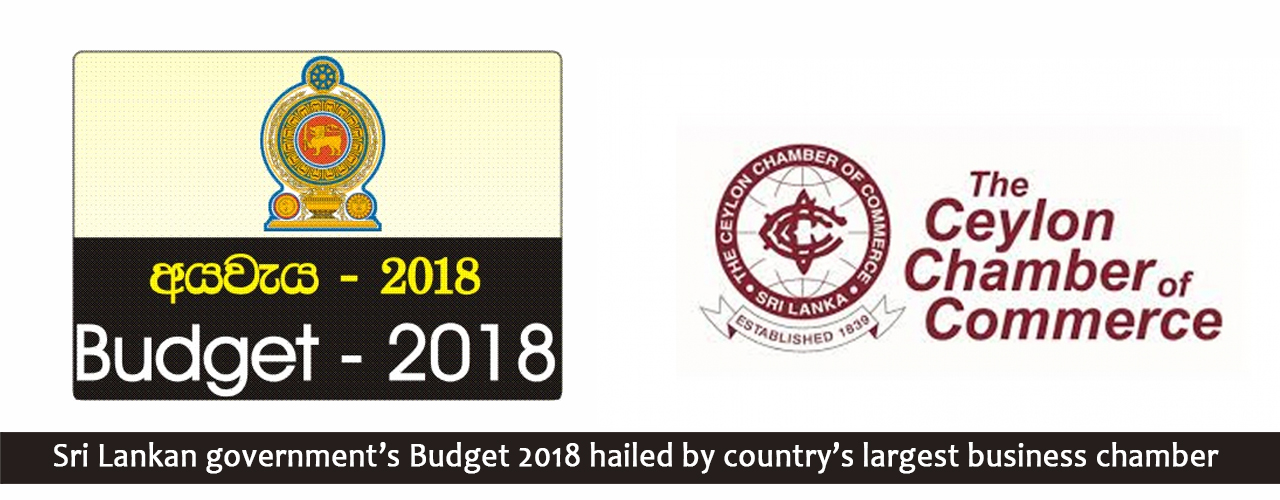Sri Lankan government’s Budget 2018 hailed by country’s largest business chamber
Sri Lanka’s largest business chamber, the Ceylon Chamber of Commerce (CCC) has welcomed the budget for 2018 while calling on the government to end the practice of overnight tax changes.
“While we see many proposals complimenting the medium-term vision of the government beyond 2018, it is important that the government does not waver in the near-term from the current fiscal consolidation path,” the Chamber has stated.
The Chamber has broadly backed increases in valued added taxes (VAT) and a revamped income tax law, which was discussed with tax payers.
Following is the full-statement:
Ceylon Chamber Welcomes 2018 Budget but Urges Focus on Monitoring its Effective Implementation .
The proposed 2018 National Budget progresses the recent economic policy visions of the government. There is a distinct move in the 2018 Budget towards putting into action strategies outlined in Vision 2025 and the Prime Minister’s economic policy statement of October 2017. This is particularly the case with initiatives such as boosting trade and investment, improving housing ownership and the development of SMEs. The Ceylon Chamber of Commerce welcomes the proposals to drive Sri Lanka to becoming a more environmental-friendly economy with an emphasis on improving access to finance for the development of enterprises, SMEs and start-ups.
Focus on Macroeconomic Stability
While we see many proposals complimenting the medium-term vision of the government beyond 2018, it is important that the government does not waiver in the near-term from the current fiscal consolidation path. The budget deficit target of 4.6% of GDP set out for 2017 in last year’s budget is expected to miss its target by 0.6% in 2017. While this is due to a higher interest expenditure than forecasted, it would have been mitigated if revenue grew as forecasted with the successful implementation of revenue proposals in the 2017 Budget.
The aim to reduce the deficit to 4.8% in 2018 is a less ambitious target compared to previous years and is attainable if the tax revenue measures proposed in the 2018 budget are implemented. This aim will be complimented by the new Inland Revenue Act which is expected to come into effect from 1st April 2018. The continuation of fiscal consolidation will support monetary policy and help develop the recent improvement in macroeconomic stability with the build-up of reserves and improvement in the balance of payments.
Implementation Mechanisms
We welcome the initiative by the Finance Ministry to set up an Implementation Unit to monitor the progress of the proposals outlined in the speech. We look forward to the operationalization of such a unit given a similar proposal was announced in the 2017 Budget as well with a committee proposed comprising of members of the private and public sector to monitor the implementation process.
It is important to have confidence that the government is serious about each of the many proposals announced in the 2018 budget. Too often we have seen ambitious and laudable proposals confined to the budget speech with the lack of implementation creating an environment of policy uncertainty.
There is a lack of attempt made to implement and honour these pledges. Some previous proposals that have remained unimplemented in recent budgets, are repeated in the 2018 budget. We call on the government to take serious steps to implement the announced proposals so as to improve the credibility of government.
Consultative Approach in Implementation
We hope that the outputs and outcomes of the Implementation Unit will be available to the public as reported and include regular consultations with private sector organisations.
The Ceylon Chamber is willing to engage with this proposed unit to provide feedback and input from the private sector on proposals that offer value to industry.
It is important for the proposed policies to be operationalised with specific timelines put in place beyond preliminary indications outlined in the 2018 Budget speech. The above steps will help restore and renew public and investor confidence that the desired targets will be met as planned.
Certain Concerns
While there is less ambiguity in a majority of the proposals, certain measures could have a negative impact on industry if implemented as mentioned in the 2018 Budget. Measures to raise revenue through new levies (Special Levy for Debt Repayment and Cellular Tower Levy) could adversely impact industries that are also facing regulatory, investment and external challenges. Proposals such as this and removal of para tariffs, reforming existing laws/acts and VAT exemptions (such as in the sale of condominium housing units) will require further clarification and input from the private sector before implementation.
We also recommend the government progress their renewed commitment in State Owned Enterprise (SOE) reforms and Capital Market development through the divestment in holdings of non-strategic enterprises, with a credible plan of action. Initiatives in shifting towards electric vehicles must be supported by a long-term energy plan that will complement the end objective of using non-fossil sources.
Repositioning the Purpose of National Budgets
The National Budget should not be viewed as an all-encompassing policy document of the government. Instead, National Budgets should focus on actionable outcomes within the relatively short time period of a year while facilitating the long-term vision. Further, National Budgets should shift from imposing overnight tax changes that have proved in the past to be of a disruptive nature for businesses and instead, aim to provide grace periods for implementation of medium to long-term tax plans. The 2018 Budget provides a good foundation for budgets to be viewed in this light.
OSL take:
The CCC has noted that it welcomed the proposals in Budget 2018 to drive Sri Lanka to becoming a more environmental-friendly economy with an emphasis on improving access to finance for the development of enterprises, SMEs and start-ups. The commendation by the country’s largest business chamber would undoubtedly add to investor confidence and would be an impetus to those in search of business opportunities in Sri Lanka.
| Article Code : | VBS/AT/16112017/Z_2 |

